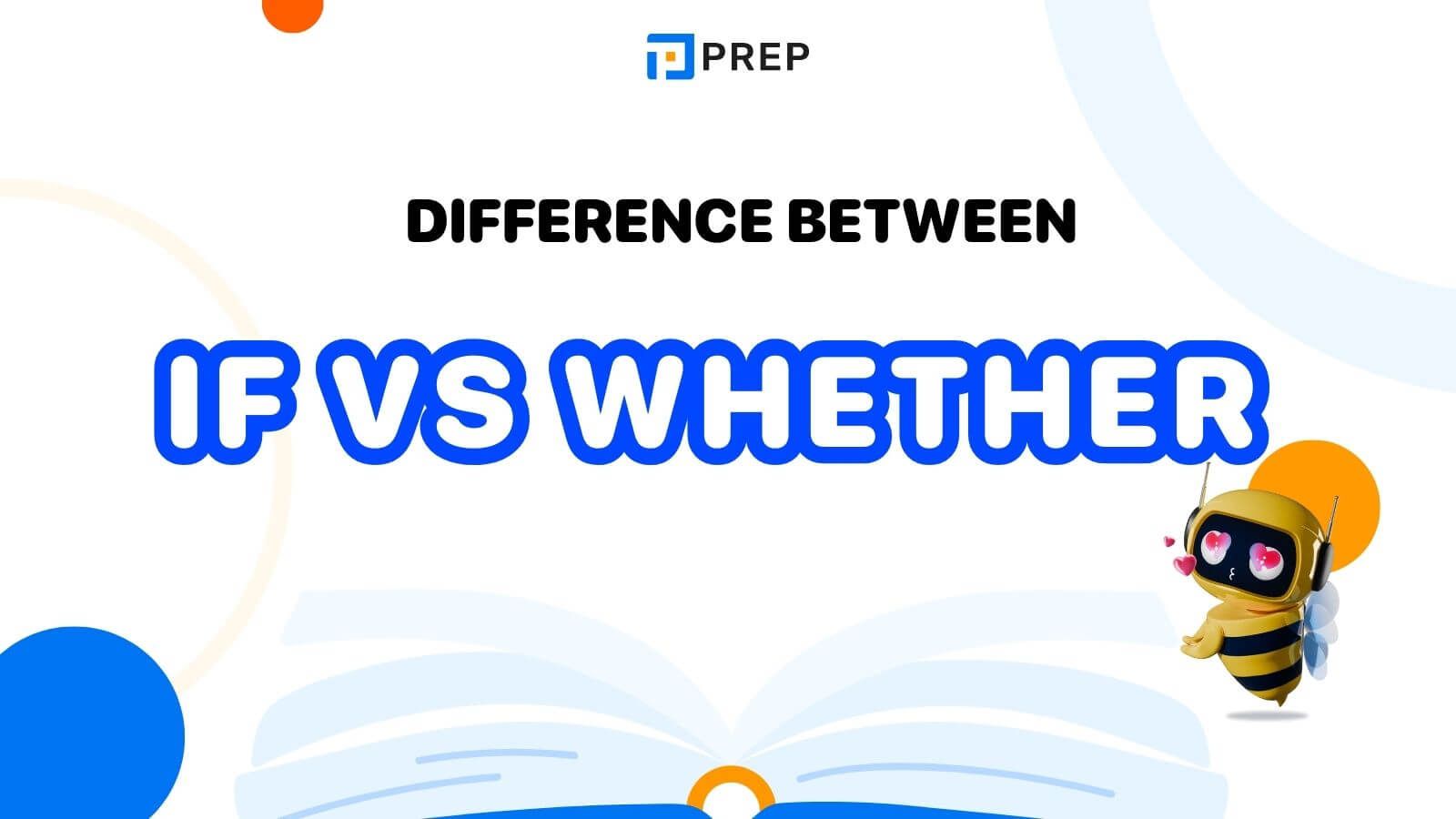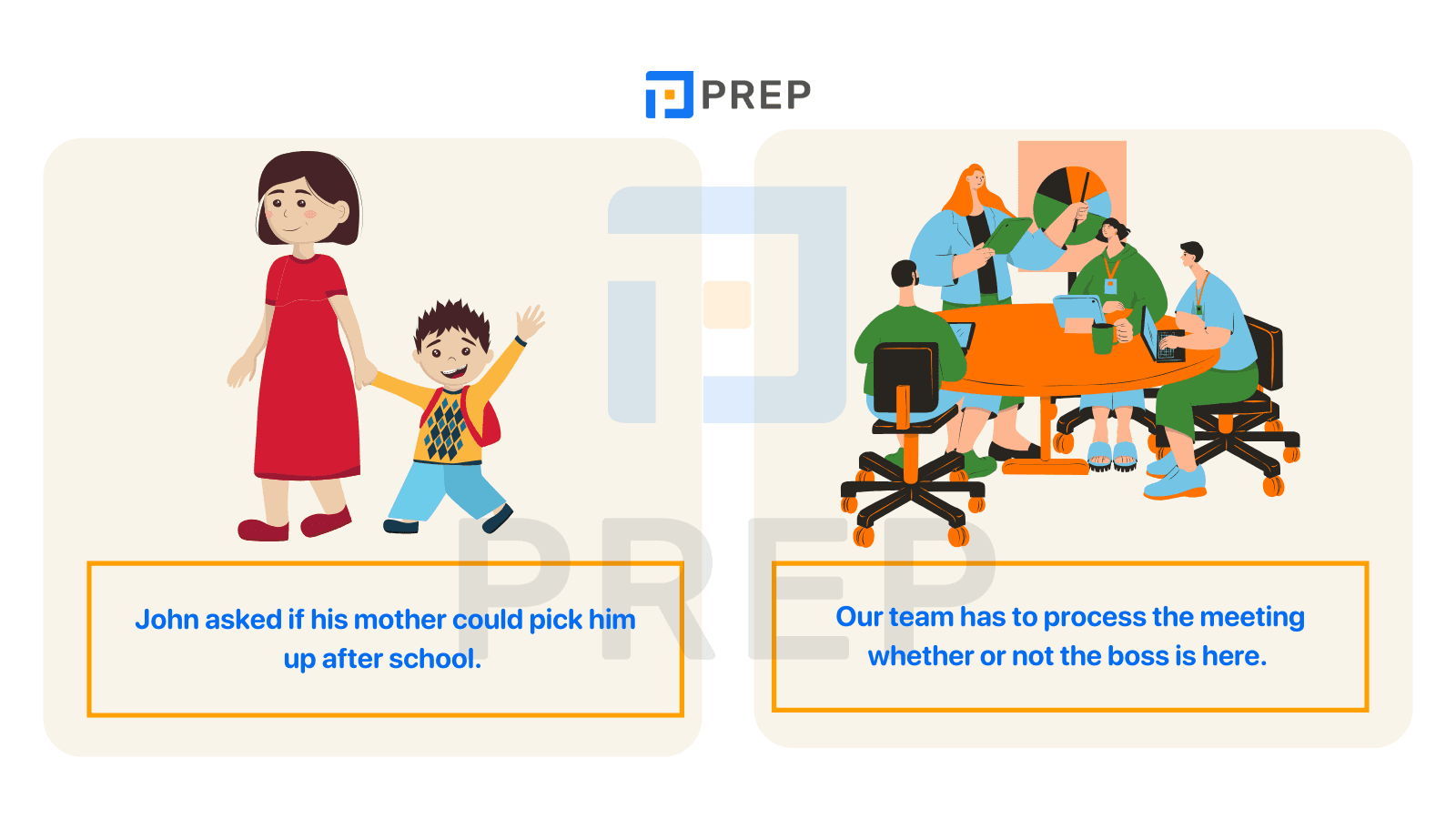If vs Whether: Grammar Rules and Common Mistakes
Understanding when to use “if and whether” is essential for mastering English grammar and test performance. This guide breaks down their meanings, key differences, and how to use them correctly in conditional sentences, indirect questions, and formal writing tasks like IELTS and TOEIC.

I. What Do “If and Whether” Mean in English?
In English grammar, “if and whether” are often used in similar contexts, but they serve different functions depending on the sentence structure. Understanding their meanings and grammatical roles is essential for learners aiming to write and speak clearly — especially in exams or formal writing.
-
“If” is most commonly used to express conditions or possibilities. It introduces hypothetical or real situations and is a key part of conditional sentences.
Example: If it rains, we’ll stay indoors.

-
“Whether” is typically used to introduce choices or indirect yes/no questions. It implies a level of uncertainty or alternatives.
Example: I don’t know whether she will come.
While both can introduce indirect questions, “whether” is usually preferred in formal, written English, especially when followed by “or not” or when used as the subject of a sentence.
This subtle distinction becomes important in academic writing, speaking exams, or work-related communication — and the right choice can make your message sharper and grammatically accurate.

II. Key Differences Between “If and Whether”
Although “if” and “whether” can both introduce indirect yes/no questions, they are not always interchangeable, especially in academic writing, IELTS preparation, TOEIC, or formal business communication contexts.
Formality and Context
- “Whether” is considered more formal than “if”.
- In academic essays, professional emails, or formal writing, use “whether” to show clarity and precision.
Example (formal): The supervisor asked whether the report was submitted.
Example (informal): She asked if the report was ready.
Use of "or not"
-
Only “whether” can be confidently followed by “or not”, especially when showing alternatives or in fixed phrases.
Let me know whether or not you can attend.
Incorrect: Let me know if or not you can attend.
Note: While "or not" can sometimes be omitted, it's more natural and grammatically correct when paired with "whether".
If vs Whether – Comparison Table
|
Feature |
If |
Whether |
|
Function |
Condition or indirect question |
Alternatives or indirect question |
|
Formality |
Neutral / informal |
More formal |
|
Used with "or not" |
Often incorrect |
Correct usage |
|
In conditional sentences |
Yes |
No |
|
After prepositions |
Generally incorrect |
Correct |
|
Example sentence |
If it rains, we’ll stay inside. |
I’m unsure whether to go or stay. |
Understanding these differences allows English learners to choose the right word depending on the formality, grammar structure, and clarity required in a sentence. This is especially important in tests like IELTS or TOEIC, where grammatical accuracy matters, and understanding related grammar forms like the perfect gerund can further improve your score.
III. When to Use “If” and When to Use “Whether”?
While "if" and "whether" are sometimes used in similar grammatical structures, they are not always interchangeable. Knowing when to use one over the other will help you avoid ambiguity, particularly in formal writing, exams, and professional contexts.
1. Conditional Sentences
In English, “if” is the standard word used to introduce conditional sentences. These are statements that describe a possible situation and its outcome. Conditional sentences are commonly structured using "if-clauses" to present a condition followed by a result clause.
There are four main types of conditionals:
|
Type |
Use |
Example |
|
Zero Conditional |
General truths, scientific facts |
If water reaches 100°C, it boils. |
|
First Conditional |
Real condition in the future |
If it rains tomorrow, we’ll cancel the picnic. |
|
Second Conditional |
Unreal or imaginary present/future situations |
If I had more time, I would join the course. |
|
Third Conditional |
Unreal past situations (regret, reflection) |
If they had studied harder, they would have passed the test. |
In all these cases, “if” is required to express the conditional logic. “Whether” cannot be used to replace “if” here without creating ungrammatical or incorrect sentences.
- Incorrect: Whether I were rich, I would buy a house.
- Correct: If I were rich, I would buy a house.
2. Indirect Yes/No Questions
Both “if” and “whether” can be used to noun clauses in indirect yes/no questions — that is, questions that are reported or embedded within another sentence, rather than directly asked.
For example:
- Direct question: "Are you coming?"
- Indirect question: She asked if I was coming.
Or: She asked whether I was coming.
Are "if" and "whether" interchangeable in indirect questions?
In many cases, yes — both can be correct. However, there are some important distinctions:
- Formality: “Whether” is more formal and is generally preferred in academic or written English, particularly in formal reports, essays, or emails.
- Use before "or not": Only “whether” is grammatically correct when directly followed by “or not”.
Correct: I don’t know whether or not he’ll attend.
Incorrect: I don’t know if or not he’ll attend. - Clarity: “Whether” often provides more clarity when alternatives are implied.
Example: We’re discussing whether we should hire one candidate or another.
(Not natural to use "if" in this context.)
In brief:
- Use either "if" or "whether" when reporting a yes/no question without alternatives and in informal contexts.
- Use "whether" when writing formally, when followed by “or not”, or where a clear alternative exists.
Mastering this usage improves both spoken and written communication — particularly in exams like IELTS Writing Task 2 or professional communication.

3. After Particular Verbs
Certain clauses introduced by “if” or “whether”. These verbs typically relate to thinking, asking, deciding, or knowing — verbs that introduce uncertainty, alternatives, or reported speech.
Common examples include: ask, know, wonder, decide, find out, learn, remember, explain, tell
When both “if” and “whether” are acceptable
For many of these verbs, both “if” and “whether” are grammatically correct, especially in spoken or informal contexts.
Examples:
- He asked if she was available.
- He asked whether she was available.
- I don't if he called.
- I don’t know whether he called.
When “whether” is preferred
In formal writing, or when the sentence involves alternatives, “whether” is the preferred or required choice. It’s also necessary when followed by “or not”, used after prepositions, or functions as the subject/object of the sentence.
Examples:
- We’re deciding whether to continue the project.
- Itwhether he agrees.
- Whether we go or not is still uncertain.
By understanding which verbs allow which structure, learners can write more naturally and avoid common grammar mistakes — especially in tasks like IELTS Writing, academic reports, or business emails.
IV. Common Mistakes with “If” and “Whether”
Although “if” and “whether” are often introduced together in grammar lessons, misusing them can lead to awkward, unclear, or even incorrect sentences — especially in formal writing or test situations. Below are two of the most common mistakes English learners make when using these words.
Using “If” Instead of “Whether” in Formal Writing
One of the most frequent mistakes is using “if” in situations where “whether” is more appropriate — especially in academic essays, professional emails, and research papers.
- Incorrect: Let me know if you agree or not.
- Correct: Let me know whether you agree or not.
Why this matters:
- “Whether” introduces alternatives explicitly — often followed by “or not.”
- It creates a formal tone and avoids ambiguity.
- “If” in this context sounds conversational or unclear, particularly in writing.
Use “whether”:
- When alternatives are implied (agree or disagree, go or stay)
- In formal logic, reporting, or technical explanations
- When writing essays (e.g., IELTS Writing Task 2 or academic journals)
Redundancy with “Whether or Not”
Another common mistake is overusing or misplacing “or not”. “Whether or not” is necessary when the outcome is the same in both situations, or when expressing a point that applies regardless of the choice.
- Correct: I’ll go to the wedding whether or not he’s there. (The speaker plans to go in both cases.) In contrast, don’t use “or not” if there is no clear benefit from adding it:
- Wordy: I don’t know whether or not she’ll come.
- Better: I don’t know whether she’ll come.
Avoid adding “or not” unless it adds meaning, emphasis, or contrast. Clear and concise writing is better for formal tests like IELTS, TOEFL, or TOEIC.
V. Using “If” and “Whether” in Academic and Test Contexts
Mastering the correct use of “if” and “whether” is not just a matter of grammar — it can affect how well your ideas are understood and graded in English language exams, as well as in academic writing tasks. Below are key contexts where these words frequently appear in exams like IELTS and TOEIC, along with useful tips.
IELTS Writing and Speaking
In IELTS, clarity and academic tone are essential — especially in Writing Task 2.
- In essays, use “whether” to introduce alternatives or discuss multiple views. This improves formality and logical flow.
Example: Whether governments or individuals should take responsibility for environmental protection is widely debated. - In Speaking Part 2 and 3, “if” is commonly used to create conditional examples or express hypothetical ideas.
Example: If I had the chance to study abroad, I would go to Canada.
Tips:
- Use “if” for examples, reasoning, and speculation (helps fluency score).
- Use “whether” to sound more precise when you discuss options or uncertain outcomes.
TOEIC Reading and Grammar Sections
In TOEIC — especially Part 5 (Incomplete Sentences) and Part 6 — questions often test your ability to distinguish between “if” and “whether” in workplace and formal writing contexts.
Common traps: Replacing “whether” with “if” after prepositions or immediately before “or not.”
Example question (grammar cloze):
- Please let the manager know ______ you can attend the meeting.
- Correct: whether (“if” would sound informal and be grammatically awkward)
VI. If and Whether exercises with answers
Practice is essential for mastering the difference between “if” and “whether.” Below are a variety of exercises to help you apply what you've learned — from fill-in-the-blank tasks to sentence correction. All exercises come with answers and brief explanations to reinforce your understanding.
Exercise 1: Fill in the Blank
Choose “if” or “whether” to complete each sentence correctly.
- I’m not sure ______ he’ll accept the offer.
- We’ll go for a walk ______ it doesn’t rain.
- They asked me ______ I wanted tea or coffee.
- Let me know ______ or not you’re interested.
- He doesn't know ______ to apply for the scholarship.
Exercise 2: Error Correction
Find and correct the mistakes involving “if” or “whether”.
- I wonder if or not she’ll come to the conference.
- The teacher asked that I know if I understand the rule.
- They’re discussing if they should expand to new markets.
Exercise 3: Sentence Writing Practice
Write your own sentences using:
- “if” in a conditional sentence
- “whether” to express uncertainty or alternatives
Answers
[prep_collapse_expand open_text="View more" close_text="Show less"]
|
Exercise 1 |
Exercise 2 |
Exercise 3 |
|
|
|
[/prep_collapse_expand]
Understanding how to use If and Whether correctly is crucial for expressing conditions, making decisions, and forming indirect questions. While they may seem interchangeable at first glance, their usage can vary depending on formality, structure, and specific grammar rules. Practice regularly, pay attention to the context, and soon their usage will come naturally. For more helpful tips on English grammar and usage, be sure to follow PREP’s language learning updates!

Hi I'm Chloe, and I am currently serving as an Product Content Administrator at Prep Education. With over five years of experience in independent online IELTS study and exam preparation, I am confident in my ability to support learners in achieving their highest possible scores.
Comment
Premium content
View allPersonalized roadmap
Most read












